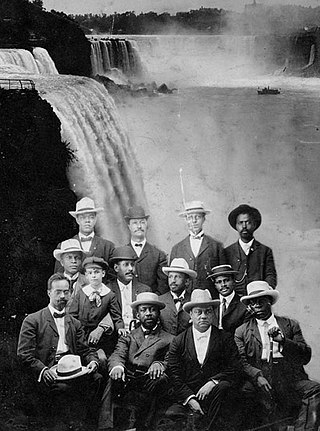
The Niagara Movement (NM) was a black civil rights organization founded in 1905 by a group of activists—many of whom were among the vanguard of African-American lawyers in the United States—led by W. E. B. Du Bois and William Monroe Trotter. It was named for the "mighty current" of change the group wanted to effect and took Niagara Falls as its symbol. The group did not meet in Niagara Falls, New York, but planned its first conference for nearby Buffalo.
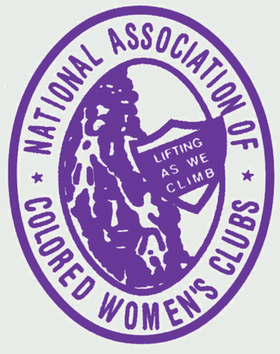
The National Association of Colored Women's Clubs (NACWC) is an American organization that was formed in July 1896 at the First Annual Convention of the National Federation of Afro-American Women in Washington, D.C., United States, by a merger of the National Federation of Afro-American Women, the Woman's Era Club of Boston, and the Colored Women's League of Washington, DC, at the call of Josephine St. Pierre Ruffin. From 1896 to 1904 it was known as the National Association of Colored Women (NACW). It adopted the motto "Lifting as we climb", to demonstrate to "an ignorant and suspicious world that our aims and interests are identical with those of all good aspiring women." When incorporated in 1904, NACW became known as the National Association of Colored Women's Clubs (NACWC).

Josephine St. Pierre Ruffin was a publisher, journalist, civil rights leader, suffragist, and editor of the Woman's Era, the first national newspaper published by and for African-American women.
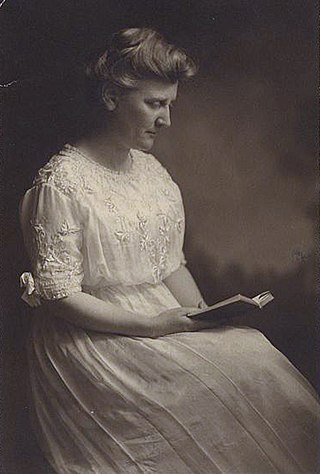
Mary White Ovington was an American suffragist, journalist, and co-founder of the National Association for the Advancement of Colored People (NAACP).

Mary Burnett Talbert was an American orator, activist, suffragist and reformer. In 2005, Talbert was inducted into the National Women's Hall of Fame.
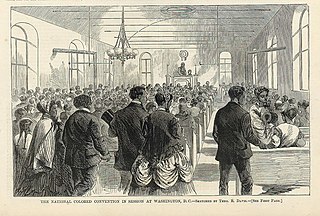
The Colored Conventions Movement, or Black Conventions Movement, was a series of national, regional, and state conventions held irregularly during the decades preceding and following the American Civil War. The delegates who attended these conventions consisted of both free and formerly enslaved African Americans, including religious leaders, businessmen, politicians, writers, publishers, editors, and abolitionists. The conventions provided "an organizational structure through which black men could maintain a distinct black leadership and pursue black abolitionist goals." Colored conventions occurred in thirty-one states across the US and in Ontario, Canada. The movement involved more than five thousand delegates and tens of thousands of attendees.
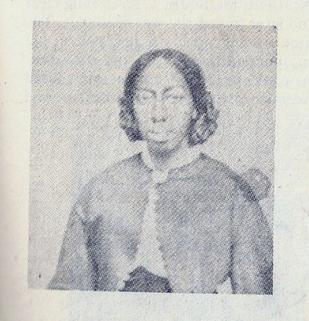
Eliza Ann Gardner was an African-American abolitionist, religious leader and women's movement leader from Boston, Massachusetts. She founded the missionary society of the African Methodist Episcopal Zion Church (AMEZ), was a strong advocate for women's equality within the church, and was a founder of the National Association of Colored Women's Clubs.

Florida Ruffin Ridley was an African-American civil rights activist, suffragist, teacher, writer, and editor from Boston, Massachusetts. She was one of the first black public schoolteachers in Boston, and edited The Woman's Era, the country's first newspaper published by and for African-American women.

Ella Lillian Davis Browne Mahammitt was an American journalist, civil rights activist, and women's rights activist from Omaha, Nebraska. She was editor of the black weekly The Enterprise, president of Omaha's Colored Women's Club, and an officer of local branches of the Afro-American League. On a national stage, in 1895 she was vice-president of the National Federation of Afro-American Women, headed by Margaret James Murray, and in 1896 was a committee member of the successor organization, the National Association of Colored Women, under president Mary Church Terrell.
The First National Conference of the Colored Women of America was a three-day conference in Boston organized by Josephine St. Pierre Ruffin, a civil rights leader and suffragist. In August 1895, representatives from 42 African-American women's clubs from 14 states convened at Berkeley Hall for the purpose of creating a national organization. It was the first event of its kind in the United States.

Rosa L. Dixon Bowser was an American educator. She was the first black teacher hired in Richmond, Virginia. She organized the Virginia Teachers' Reading Circle, which became the Virginia State Teachers Association, the first organization representing black teachers in Virginia, serving as the organization's president from 1890 to 1892. Bowser was president of the Woman's Christian Temperance Union in Virginia, as well as founder and first president of the Richmond Woman's League. She was a correspondent for the magazine The Woman's Era, and wrote essays for national publications.
Janet Walker (1850–1940) was a costumier and businesswoman in Queensland, Australia. She operated the largest private dressmaking establishment in colonial Brisbane.
The Woman's Era Club was an African-American women's civic organization founded in Boston, Massachusetts, in between 1892 and 1894 by Josephine St. Pierre Ruffin. The Club was the first black women's club in Boston. The organization was especially well-known for the conflict caused when Ruffin attempted to desegregate the General Federation of Women's Clubs (GFWC) in 1900.
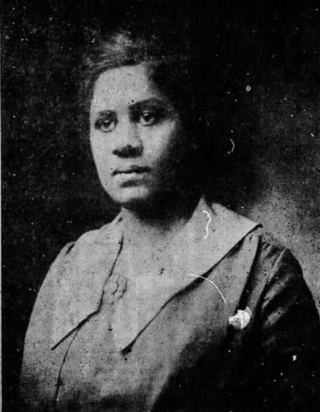
Ora Brown Stokes Perry (1882–1957) was an American educator, probation officer, temperance worker, suffragist, and clubwoman based in Richmond, Virginia.

Sadie L. Adams was an African-American teacher, suffragist, and clubwoman. She was one of the first women to serve on an election board in Chicago and one of the founders of the Douglas League of Women Voters. In 1916, she served as a delegate from Chicago's first black suffrage organization, the Alpha Suffrage Club, to the National Equal Rights League conference. She was elected president of the Chicago and Northern District Association of Colored Women's Clubs in 1921, serving into 1934. She was also involved in various charity clubs and organizations that helped to engage women in war work during World War I, provide resources for underserved youth, and increase suffrage for Black women.
Alice W. Wiley Seay was an American social worker and founder of the Empire State Federation of Women's Clubs. She was also involved in charity work through the Dorcas Society and women's clubs. She held leadership roles in many of these organizations.

Helen Appo Cook was a wealthy, prominent African-American community activist in Washington, D.C., and a leader in the women's club movement. Cook was a founder and president of the Colored Women's League, which consolidated with another organization in 1896 to become the National Association of Colored Women (NACW), an organization still active in the 21st century. Cook supported voting rights and was a member of the Niagara Movement, which opposed racial segregation and African American disenfranchisement. In 1898, Cook publicly rebuked Susan B. Anthony, president of the National Woman's Suffrage Association, and requested she support universal suffrage following Anthony's speech at a U.S. Congress House Committee on Judiciary hearing.
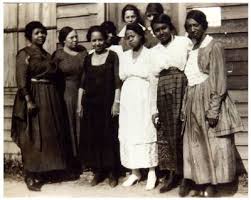
Fannie Hopkins Hamilton(1882 – 1964) was a dress maker and suffragist who joined the Equal Suffrage Study Club and uplifted the black community in Wilmington, Delaware. She was a leader, contributor, activist, and supportive teacher throughout her life as a suffragist.
Mary H. Dickerson was an African American businesswoman and clubwoman. Dickerson founded several women's groups in the New England area and in Newport, Rhode Island. Her dress shop catered to prominent clients in Newport and she was the first Black woman to open a shop on her block on Bellevue Avenue.
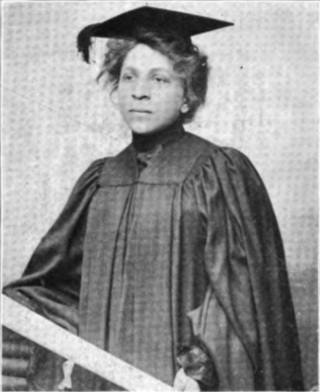
Alice Mariah Waring Holmes was an American educator, suffragette, and dentist, thought to be the first female Black dentist in Washington D.C.















